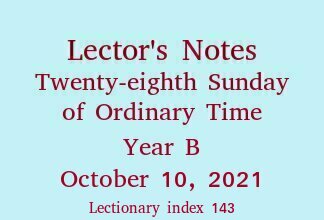

October 10, 2021, Twenty-eighth Sunday of Ordinary Time
This reading praises wisdom, in which the author includes the value of adhering to ancient religious traditions. The book was written for Jews tempted to assimilate into larger pagan societies.
The context of this reading is a long exposition of why Jesus reveals the word of God more clearly and completely than Moses was able to do. The letter was written for Christians who had converted from Judaism.
This is another passage showing how Saint Mark wants his readers to know the full cost of following Jesus.
Our Liturgical Setting: In today's gospel, Mark 10:17-30, Jesus challenges his disciples, in no uncertain terms, to prefer membership in the reign of God over every other good. Today's first reading, from a part of the Hebrew scriptures only a little older than the gospel, teaches, somewhat analogously, that one should prefer wisdom to every other good thing.
The Historical Situation: About a hundred years before the birth of Jesus, a learned and faithful Jew in Alexandria, Egypt, assessed the situation for fellow Jews there. A minority in a great cosmopolitan city, these Jews were cut off from the comforting religious institutions of Jerusalem, and subject to great cultural pressure to "assimilate," that is, to just become like everybody else. Our devout scribe tried to bolster their faith with a book now called "Wisdom," about a virtue and way of life that he called wisdom. By this he meant not just being wise in the conventional sense, but a spiritual wisdom that included adhering to older Jewish traditions.
Appreciating The Author's Literary Method as you Proclaim it: The author personifies Wisdom, that is, speaks of Wisdom as if it were a person, a very desirable woman. He has a very self-satisfied sound as he names the goods less precious to him than Wisdom. He speaks in the past tense, nostalgically. It reminds me of feelings evoked by the song, "The Impossible Dream," from the musical Man of La Mancha. If you have loved someone that way, or have given yourself so completely to a worthy cause, reflect on that experience as you prepare to proclaim this.
Technically, note that the pronoun "her" occurs ten times, referring to the nouns "prudence" and "wisdom," which occur only once each. So, to be sure that your listeners remember what (whom) you're talking about, be sure you emphasize the word "wisdom" when you get to say it in the title (A Reading from the Book of Wisdom) and in the first sentence.
The Historical Situation: Remember that the Letter to the Hebrews was written to bolster the faith of Jewish converts to Christianity; they suffered the contempt of old Jewish friends who had not converted, and felt nostalgia for institutions of Judaism (rituals, sacrifices, priesthood, etc.) that were absent or greatly transformed in their new religion. This letter tries to show them how they have it better than they did before. Because its original audience was Jewish converts, the style of argumentation in the Letter to the Hebrews is "rabbinical," that is, like the teaching/speaking style of First-century rabbis, familiar to the original audience of this letter. But that style is foreign to us Twenty-first Century Gentile readers. (Some rabbis still argue this way. You can get the flavor from the very engaging novels of American Jewish writer Chaim Potok (1929-2002), like The Chosen (1967) and The Promise (1969).)
Our Literary Conundrum: The Letter to the Hebrews can be understood, without a doubt, but only if one is willing to study it as a whole and in context. Piecemeal fragments, two verses at a time, may be useful for something, but by themselves, out of context, in isolated chunks every seven days, they defy the human intellectual nature upon which grace might otherwise build.
To make sense of today's verses, go back to the beginning of chapter 3, where the author explains why Jesus is superior to Moses. The people listening to Moses speak the word of God simply did not heed that word. Had they done so, the result would have been for them to enter into God's rest (the Sabbath rest). But since God wanted people to enjoy that rest, he has offered another chance, predicted by David in Psalm 95, "If today you hear God's voice, harden not your hearts." That second chance has come in Jesus. He announces the word of God again, and the word is [finally we're back to today's text] "sharper than any two-edged sword, ... able to [penetrate] the heart." We can conceal nothing about ourselves, our behavior, our motives, our responsibility, from the utterly truthful word of God. We cannot escape accountability for our response to this word of God.
Proclaiming It: The lector may find herein no clue about how to proclaim this brief passage. Straightforward and matter-of-fact must do. But the lector may find another reason to love what he or she does as a proclaimer of this mighty word. One of the reasons the Hebrew Christians were better off with Jesus than with Moses was that Jesus was the superior proclaimer of God's word. Let the lector relish the opportunity to imitate Jesus.
Chinese Lantern Festival at Missouri Botanical Garden, 2015 (detail), photo by Ryan Thomas Law. The Garden is a cultural gem in the heart of Saint Louis, Missouri, U.S.A. and a world-leading center for botanical research and plant-species preservation. The Garden frequently engages a traveling lantern show both to raise money and to celebrate its partnership with Chinese scientific and preservationist efforts. But whether or not there's a current nighttime special show, the Garden is worth a visit.
This page updated August 18, 2021